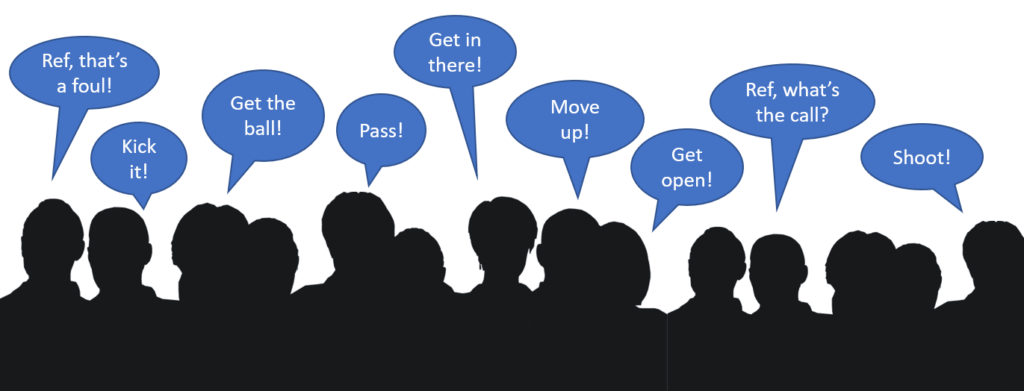

Although NGS undoubtedly has fantastic coaches and parents, many well-intentioned spectators show their enthusiasm, not just by cheering, but by calling out instructions to players on the field.
Here are a few of the phrases we hear over and over again from the sidelines:

There is nothing inherently wrong about these comments, but it is counterproductive. Constantly directing a child where to go and what to do during a game is disruptive and detrimental to their long-term development as a soccer player. The kids get confused, feel pressured, or become overly reliant on external instructions instead of learning critical decision-making skills. Our young referees become intimidated, lose their confidence, and find another job.
Take a minute to imagine your child watching you and instructing your every move:
Do you feel annoyed? Distracted? Confused? Will this environment help you perform your best or learn to make decisions in the moment?
Silent Saturday is a national youth soccer effort to enhance player development and game enjoyment by reminding coaches and spectators to let the players own the game. Players overwhelming report positive feelings about Silent Saturday. Most kids find it easier to concentrate and enjoy making decisions without the risk of being corrected from the sidelines.
The goals of the program are simple. During the game, we hope to:
Coaches are encouraged to keep instructions to on-field players to a minimum. Sit during the game and use the opportunity to coach the substitutes who are with you on the sidelines. Have them carry messages to the on-field players when they enter the game.
Silent Saturday is a great reminder that the vast majority of coaching should happen at practice. Watch, learn and take notes on what your players actually understand about the game and areas that need more focus. Often, we get wrapped up in seeing trouble spots during the game and expect players to fix it there on the spot.
Spectators are encouraged to sit down and revel in the kids playing a game that they enjoy. Show support for both teams with enthusiastic applause and signs. Instead of calling out directions or reminders, make positive general statements to support the players without mentioning any player names.
Try these tips for no-directions cheering from the Positive Coaching Alliance:
Avoid giving your child advice on the sidelines by committing to No-Directions Cheering. Eliminate
verbs in your cheering because you can’t give advice without verbs. For example, “Pass the ball to
Sarah” is a no-no because it uses the word “pass” as a verb to give directions. On the other hand,
“Great pass, Sarah!” gives no directions. You’re just commenting (appreciatively) on what you see
Sarah doing.
Here are some examples of No-Directions Cheering:
• “Great effort!”
• “Good hustle!”
• “Way to play defense!”
• “Nice kick!”
• “Terrific play!”
• “Way to go!”
No-Directions Cheering is important because your child will do better if it’s their game. So, provide
encouragement without direction – or even enjoy the game in silence. The more space you leave
them to be the actor – a proactive player rather than a puppet on a string – the better.
NGS has been running a Silent or Seatbelt Saturday for many years. We have found it to be beneficial for our players and coaches. Some adults hate it; some appreciate it. Most players like it. The referees love it. We appreciate your willingness to try a different way to show your engagement by applauding, rather than verbally instructing players from the sidelines.